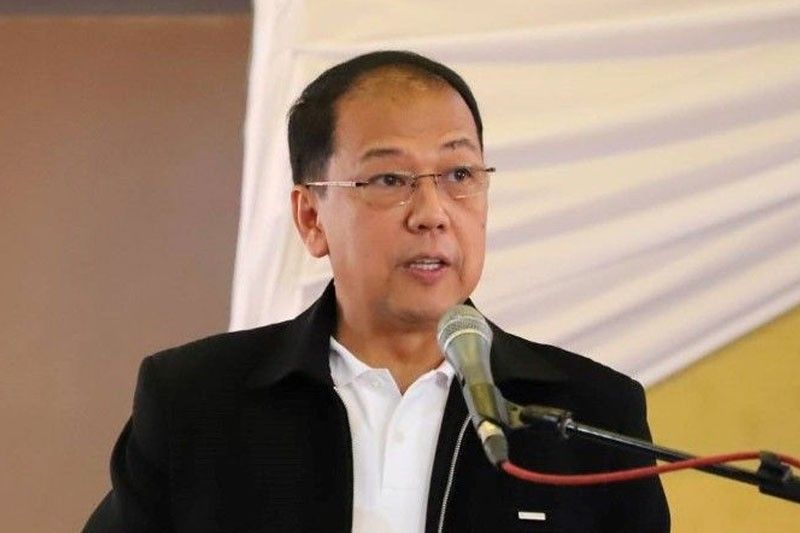Galvez told to inform Senate on vaccines

MANILA, Philippines — President Duterte has ordered National Policy Against COVID-19 chief implementer and vaccine czar Carlito Galvez Jr. to inform the Senate about the agreement on the national vaccination program, according to Sen. Bong Go.
“I’ve talked to the President who instructed Sec. Galvez to inform Senate President Sotto of the agreement,” Go said, referring to COVID-19 vaccines, in a video message sent to Senate reporters yesterday.
“For the sake of the people and the poor Filipinos, I am appealing to President Duterte and Senate President Vicente Sotto III to unite for the country to be able to start vaccination,” Go added. “Senate President Sotto and I also talked about this to have transparency.”
Duterte said senators were urging the government to prioritize buying COVID-19 vaccines developed by Pfizer-BioNTech, but there were reports that some old and highly frail people in Norway died after receiving the shots.
“You senators want Pfizer? In Norway, 25 persons died after receiving Pfizer vaccination. Do you want it? We’ll order for you. That’s what you want as it repeatedly gets reported in articles,” Duterte said, speaking partly in Filipino during his weekly taped briefing.
Senators maintained that they did not endorse any brand of vaccines for the government to procure during the public hearing of the Senate committee of the whole.
Citing inconsistencies in the information provided by officials during the two-day hearing on the government’s vaccination program, senators pushed for another hearing to get more information about the government’s vaccination plan.
Sen. Panfilo Lacson noted too many loose ends in the answers of Galvez’s team regarding vaccine acquisition, including the government-to-government agreement, price of the vaccines and the timeframe of the rollout.
Motives questioned
Malacañang officials yesterday questioned the motives for conducting the Senate’s inquiry, warning that it might derail, if not adversely affect, the government’s negotiations to acquire 148 million doses of COVID-19 vaccines from various manufacturers.
Lashing out at senators’ motives in initiating the inquiry, Duterte assured the public during his nationwide address last Monday night that the government would not allow corruption to happen during the government’s procurement of the vaccines.
“Walang magic diyan (There’s no magic there). Kaya sabi ko nga, eh, kayong mga doubting Thomases, kung gusto ninyo, kayo na lang (That’s why I’m telling you doubting Thomases, if you want, you do it yourselves). I-surrender namin lahat ‘yung (we will surrender all)… so far what we have accomplished. You can form a committee or create a committee by a body – tingnan ninyo ang labas-labasan, ganoon din (look at the outcome, it will be the same),” said the President, visibly irked by the attacks of critics.
“(E)ither maniwala kayo sa amin o maniwala kayo sa akin o maniwala kayo sa kanila (you believe us or you believe me or you believe them). Maniwala kayo sa kanila (Believe them), you are free to believe them,” he added.
Confidentiality agreements
While he is ready to explain to senators and face the next hearing this Friday, Galvez said the government stands to lose its chance of acquiring around 148 million doses of the vaccines if the confidentiality agreements are violated.
“There’s no corruption in our negotiations. The price of the vaccines we are purchasing are covered by the CDA, that’s why we cannot disclose it to the public. We might lose the 148 million doses we are negotiating for with vaccine companies if we violate the agreement,” he said in mixed English and Filipino at a Palace briefing yesterday.
“We are appealing to the public to respect our contracts,” he added.
Galvez cited a news article of New Straits Times (Malaysia) warning the public on the consequences of breaking the non-disclosure agreement between pharmaceutical companies and the government.
It can lead to the cancellation of vaccine delivery, he said, adding that the agreement includes the protection of medical trade secrets and special prices given to any particular country, the timeline of the vaccine, among others.
A breach of the non-disclosure agreement could also lead to damages and the inability to obtain shipment of the vaccines, and would create an issue on credibility and reputation that may affect the government.
The national government has earmarked P82.5 billion for the vaccine procurement, with P70 billion coming from loans, P2.5 billion from the 2021 General Appropriations Act and P10 billion appropriated under Bayanihan II Act.
Presidential spokesman Harry Roque Jr. asked how the ongoing Senate inquiry would lead into the crafting of a new law related to vaccines.
“The Palace just can’t figure out what law will be crafted regarding this. If they are against the CDA, they might create a law prohibiting the CDA. If that happens, no one will sell vaccines to the Philippines,” Roque said in Filipino, as he explained Duterte’s disappointment on what he sees as preference by some senators for Pfizer.
Absolute transparency
Justice Secretary Menardo Guevarra yesterday said there is nothing wrong with the non-disclosure agreement on the prices of COVID-19 vaccines; however, there should be “absolute transparency” on the efficacy and safety of the vaccines.
Guevarra explained that while he is not discounting the possibility that there may be valid reasons not to reveal the prices of COVID-19 vaccines, he expressed belief that there should be full disclosure to the Filipino people on the effects of the vaccines.
“There may be some good reason for non-disclosure of the commercial terms such as price competition, distribution channels, etc. I believe, however, that absolute transparency is necessary in relation to the safety and efficacy of the vaccine, as the very lives of our people are at stake,” he added.
“Transparency with respect to issues of safety and efficacy should be observed at the earliest opportunity, even prior to the choice of vaccine and negotiation with the prospective provider,” he added.
Emergency response
Emergency response system for possible COVID-19 vaccine side effects is more vital than the proposed indemnification fund for those who may have adverse reactions after their inoculation, Senate President Pro Tempore Ralph Recto said yesterday.
Recto welcomed the proposal to set up an indemnification fund for Filipinos who may be harmed by vaccines but stressed that “the focus should be on strengthening emergency response to the very, very few who may suffer side effects.”
“Insurance is good. But immediate medical intervention is better,” Recto said in urging the government to ensure that vaccination sites should be near facilities that can handle “adverse post-vaccination issues.”
“If you develop an allergy, access to care is what you need more than future compensation,” he added.
Government assurance that it is ready to handle such cases is a far better way of boosting vaccine acceptance among our people than announcing an insurance fund for unpleasant events, according to the senator.
He said a good monitoring and response system that is seen by the people will inspire more confidence in the program than talks about indemnity.
Recto also said if health frontliners will get first jabs, the government should pick the vaccine that is “the best body armor for those in the line of fire.”
He said the first vaccines to arrive in the country must possess higher efficacy and effectivity rates as these will be given to medical frontliners.
“Regardless of the brand and the country of origin, let us work in bringing in one that will offer higher protection because that will, in turn, result in higher acceptance by the general public,” he said. “So that there will be a mass buy-in, let us have a good product launch.”
Vaccination plans
The Department of the Interior and Local Government (DILG) has ordered local government units (LGUs) to start preparing their vaccination plans with the expected arrival of COVID-19 vaccines next month.
DILG officer-in-charge Undersecretary Bernardo Florece Jr. on Monday said LGUs should start mobilizing their resources to ensure a smooth implementation of the national government’s COVID-19 vaccination program.
Florece reminded LGUs that their vaccination program should be aligned with the national government’s COVID-19 action plan.
“LGUs are hereby directed to prepare a vaccination plan in compliance with DOH guidelines on the national vaccination program,” he said in a memorandum circular.
Among these are preparation of risk communication plans and conduct of early vaccine communication campaigns, master list of priority eligible vaccine populations, identification of vaccine centers and cold storage facilities and providing names of health care workers who will undertake the vaccination of citizens. – Christina Mendez, Evelyn Macairan, Jose Rodel Clapano, Paolo Romero, Emmanuel Tupas
- Latest
- Trending




























